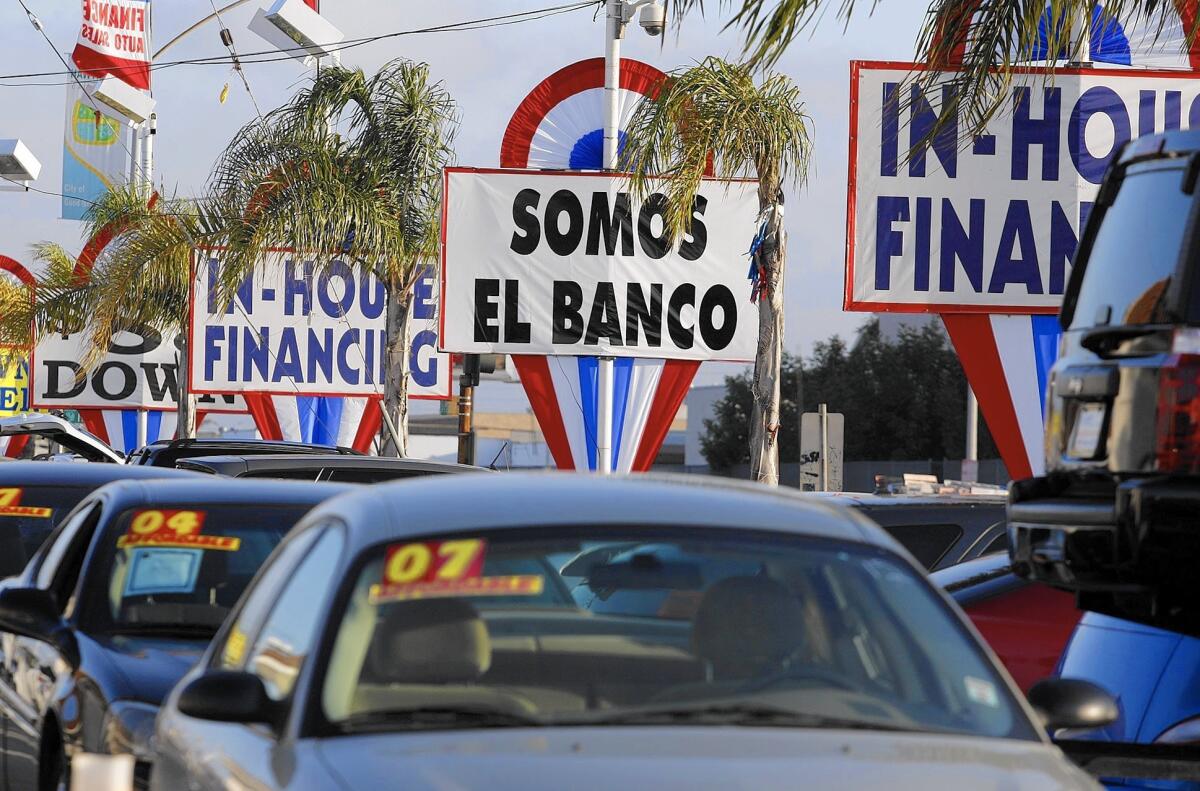Bill would limit aggressive repossession by Buy Here Pay Here dealers

SACRAMENTO — California lawmakers again are taking action to curb abuses in financing used car sales with Buy Here Pay Here loans.
Such contracts are directly funded by auto dealers that target low-income customers with poor credit. The loans, with interest rates of 30% or more, contribute to defaults for about 1 in 4 purchasers. The cars are quickly repossessed — sometimes with remote signals that stop their engines — and then resold.
The practice in recent years was spotlighted by a series of Los Angeles Times stories that spurred the Legislature and Gov. Jerry Brown to approve two bills regulating industry practices.
The Times reported in October 2011 that Buy Here Pay Here outlets annually make about $80 billion in loans, selling 2.4 million cars nationally through 33,000 dealerships.
One new consumer protection law required dealers to give buyers a 30-day, 1,000-mile warranty. A second called for posting a fair-market valuation on all cars sold. The governor vetoed a third bill regulating contract terms.
Now, Assemblyman Chris Holden (D-Pasadena) wants to limit immobilizing cars on short notice when a borrower misses a payment.
Holden’s bill, AB 265, would mandate a 10-day grace period before dealers can repossess a car with a “starter interruption device.” Dealers would also have to provide a second warning notice 48 hours before the car is rendered inoperable.
“Dealers often target the working poor and rely on repeated reselling of these high-priced vehicles to generate much of their revenue,” Holden said. “AB 265 would provide added protection for these low-income purchasers ... by slowing down aggressive repossession of cars.”
The bill passed the Assembly’s Consumer Protection Committee by an 11-0 vote and is headed to the Appropriations Committee in May.
The bill was modified in committee to remove opposition, said Bill Dohring, a lobbyist for the Independent Auto Dealers Assn. of California.
The key to crafting a compromise was reducing the warning notice from a proposed 20 days to 10 days. But even that, Dohring said, “sends the message ... that the borrower can drive the car without a payment.”
Gas prices
Years of debate over the reason for California’s high gas prices have not produced a definitive answer to why a gallon costs up to 40 cents more in the state than in other areas of the country.
Higher prices probably are caused by a combination of state taxes, expensive cleaner-burning gas and limited competition among refineries, writes Severin Borenstein, a professor of energy economics at the UC Berkeley Haas School of Business, in a recent blog post.
But paying an estimated $37 to $51 a year more for less-polluting California gasoline is worth it for the average motorist, Borenstein said. The Golden State formula has reduced health-threatening smog since the early 1990s, especially in Southern California. “The California standard,” he said, “saves at least 660 lives per year, which more than justifies the additional cost.”
Twitter: @MarcLifsher
More to Read
Inside the business of entertainment
The Wide Shot brings you news, analysis and insights on everything from streaming wars to production — and what it all means for the future.
You may occasionally receive promotional content from the Los Angeles Times.











